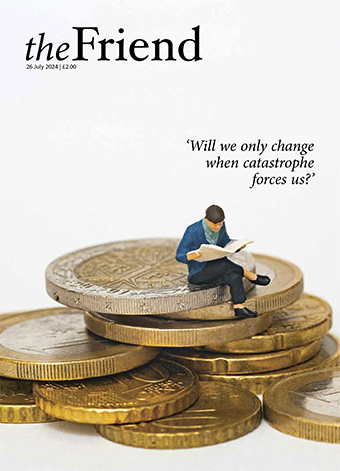
The Friend is a weekly magazine in which Friends speak to each other and to the wider world, offering their insight, ideas, news, nurture and inspiration.
Nurturing Quaker community, each issue offers a space for Friends to share their concerns, and to support each other in faith and witness.
The Friend: enriching, inspiring and connecting the Quaker community since 1843.
As a child I often saw fields where the stubble was burnt off after the harvest, to enrich the soil. When I asked a farmer why this stopped, he said, ‘It was a good practice for the son, but bad for the grandson.’ I recalled this as I listened to the contenders in the recent election promising economic growth.
We welcome the prime minister’s early recognition that the prisons crisis requires urgent attention, and his appointment of James Timpson as minister for Prisons and Probation – a man who understands the rehabilitative value of prisoner employment. Reversing decades of neglect will not be easy; we therefore call upon Shabana Mahmood, the new secretary of state at the Ministry of Justice (MoJ), to consult with experts from prison charities and elsewhere to help clarify the way ahead. The Prison Governors’ Association has warned that ‘the entire criminal justice system stands on the precipice of failure’. There must be a change of direction from ever-more offences and ever-lengthening sentences, which have become a shorthand for demonstrating that a political party is ‘tough on crime’.
When people ask me what Friends mean, exactly, by simplicity, I cheat. I quote a much-forgotten essayist called William George Jordan. Jordan mostly wrote what we might now call self-help books for the Victorian era, some of which don’t stand up to contemporary scrutiny, but he had his moments. Although he wasn’t a Quaker he sometimes sounded close to it (if we can forgive him the universal male pronoun): ‘The true Christian’s individual belief is always simpler than his church creed, and upon these vital, foundation elements he builds his life… He cares naught for the anatomy of religion; he has its soul’. Here’s the bit I quote: ‘Simplicity’, he said, is ‘restful contempt for the non-essentials of life.’
In Eden Grace’s 2019 Swarthmore Lecture, (‘On Earth as it is in Heaven: The Kingdom of God and the yearning of creation’), and in the final chapter of the accompanying book, she considers communication and motivation in relation to the climate crisis. She is acutely aware that facts about the climate crisis can generate fear, and that fear paralyses creative thought and action. ‘The research shows that facts coupled with invitations to concrete action are much more effective than facts alone,’ she says.
Africans in eighteenth-century Bristol were not a large community, and Bristol was never the home of black abolitionist leaders such as Ottabah Cugoano, Olaudah Equiano, and Ignatius Sancho. But, after work done by some Bristol Friends, it has been possible to recover the names and something of the life stories of a few young Africans whose presence in Bristol was the result of Quaker involvement in transatlantic chattel slavery. These stories provide significant evidence of Bristol’s evolving African diaspora in its earliest years. They also offer a glimpse of varied relationships between African servants and their white Quaker masters and mistresses.

Become a subscriber to enjoy unlimited access to our articles, dating back to 2009! Online subscribers get the Friend to their inbox each week, can comment on articles, and dive into our 1914-18 digital archive too!
Whether you are new to Quakerism or have been going to Meeting for years, you’ll find something here to inspire, inform and challenge you.
News | Views | Reviews
Written by and for Friends on the bench
Subscribe